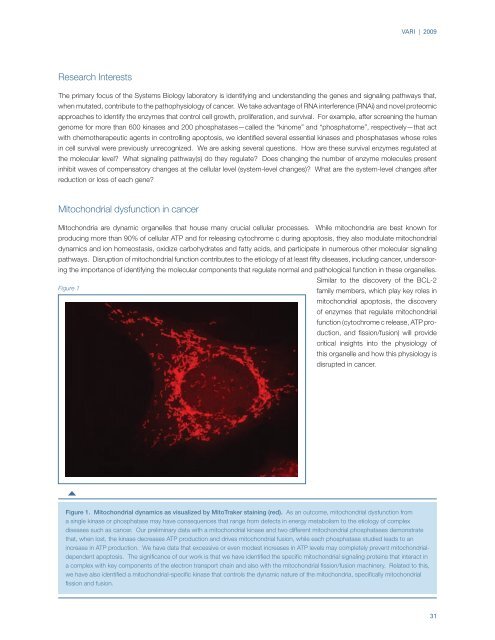2009 Scientific Report
Create successful ePaper yourself
Turn your PDF publications into a flip-book with our unique Google optimized e-Paper software.
VARI | <strong>2009</strong><br />
Research Interests<br />
The primary focus of the Systems Biology laboratory is identifying and understanding the genes and signaling pathways that,<br />
when mutated, contribute to the pathophysiology of cancer. We take advantage of RNA interference (RNAi) and novel proteomic<br />
approaches to identify the enzymes that control cell growth, proliferation, and survival. For example, after screening the human<br />
genome for more than 600 kinases and 200 phosphatases—called the “kinome” and “phosphatome”, respectively—that act<br />
with chemotherapeutic agents in controlling apoptosis, we identified several essential kinases and phosphatases whose roles<br />
in cell survival were previously unrecognized. We are asking several questions. How are these survival enzymes regulated at<br />
the molecular level? What signaling pathway(s) do they regulate? Does changing the number of enzyme molecules present<br />
inhibit waves of compensatory changes at the cellular level (system-level changes)? What are the system-level changes after<br />
reduction or loss of each gene?<br />
Mitochondrial dysfunction in cancer<br />
Mitochondria are dynamic organelles that house many crucial cellular processes. While mitochondria are best known for<br />
producing more than 90% of cellular ATP and for releasing cytochrome c during apoptosis, they also modulate mitochondrial<br />
dynamics and ion homeostasis, oxidize carbohydrates and fatty acids, and participate in numerous other molecular signaling<br />
pathways. Disruption of mitochondrial function contributes to the etiology of at least fifty diseases, including cancer, underscoring<br />
the importance of identifying the molecular components that regulate normal and pathological function in these organelles.<br />
Similar to the discovery of the BCL-2<br />
Figure 1<br />
family members, which play key roles in<br />
mitochondrial apoptosis, the discovery<br />
of enzymes that regulate mitochondrial<br />
function (cytochrome c release, ATP production,<br />
and fission/fusion) will provide<br />
critical insights into the physiology of<br />
this organelle and how this physiology is<br />
disrupted in cancer.<br />
Figure 1. Mitochondrial dynamics as visualized by MitoTraker staining (red). As an outcome, mitochondrial dysfunction from<br />
a single kinase or phosphatase may have consequences that range from defects in energy metabolism to the etiology of complex<br />
diseases such as cancer. Our preliminary data with a mitochondrial kinase and two different mitochondrial phosphatases demonstrate<br />
that, when lost, the kinase decreases ATP production and drives mitochondrial fusion, while each phosphatase studied leads to an<br />
increase in ATP production. We have data that excessive or even modest increases in ATP levels may completely prevent mitochondrialdependent<br />
apoptosis. The significance of our work is that we have identified the specific mitochondrial signaling proteins that interact in<br />
a complex with key components of the electron transport chain and also with the mitochondrial fission/fusion machinery. Related to this,<br />
we have also identified a mitochondrial-specific kinase that controls the dynamic nature of the mitochondria, specifically mitochondrial<br />
fission and fusion.<br />
31

















